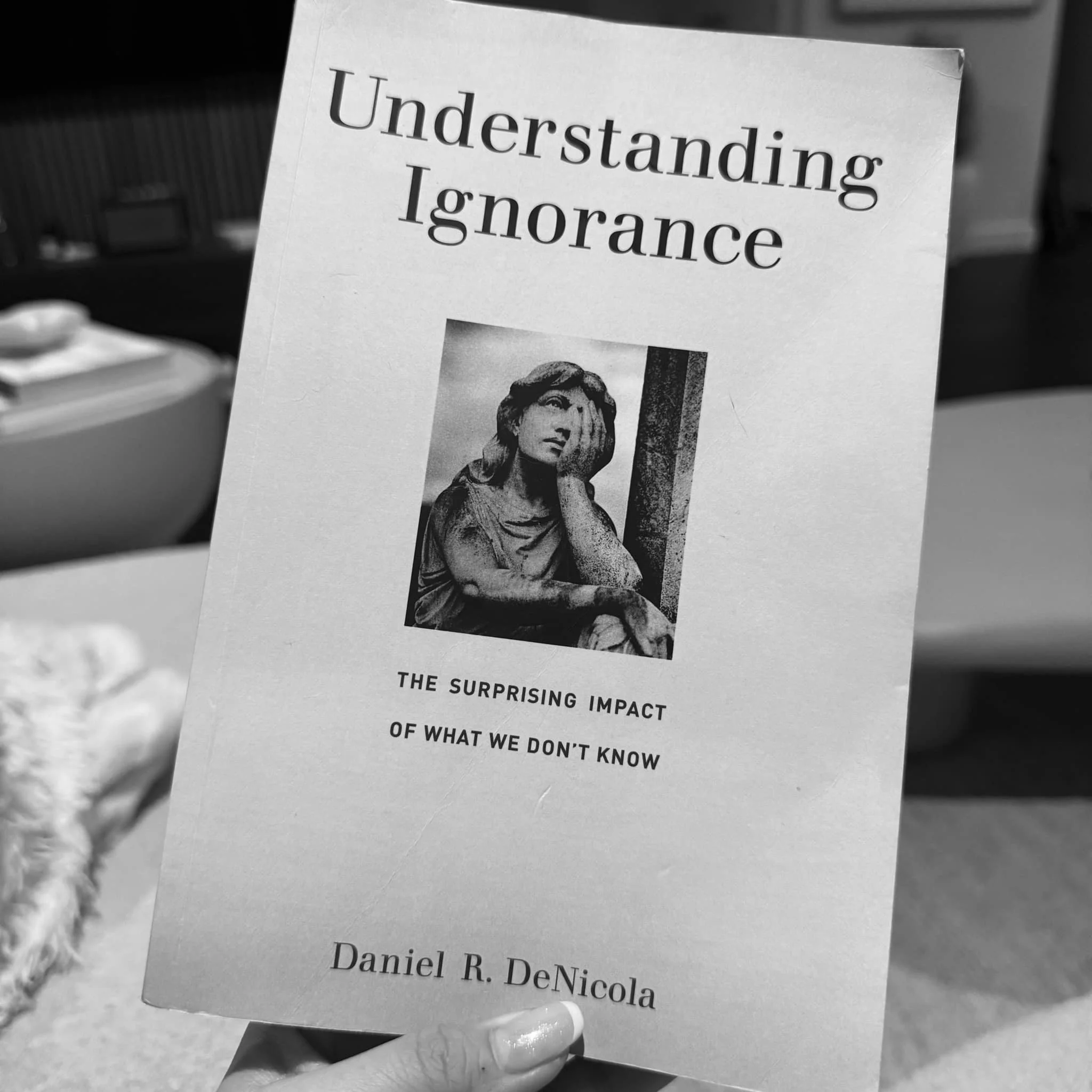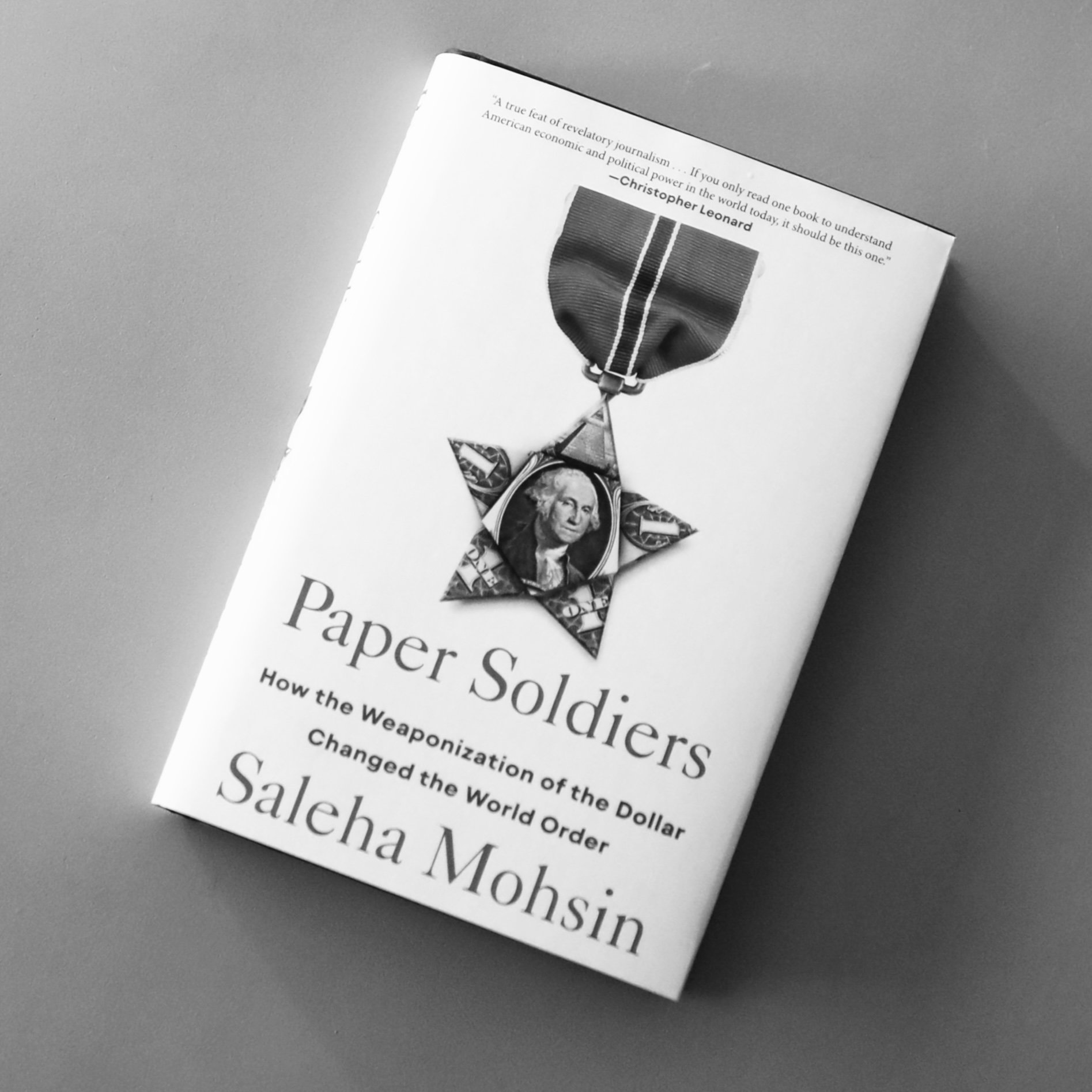Understanding Ignorance by Daniel R. DeNicola
Ignorance.
One touchy subject.
We are tackling this from a philosophical point of view— Agnoiology.
In common parlance, the appellation of “ignorant” is typically employed as a derogatory remark. This designation implicitly asserts a stance of superiority, suggesting that “I know that which they do not, plus I know that they do not know it.”
All too frequently, ascriptions of ignorance and stupidity are employed to deprecate and further marginalize minorities. To declare, "He is ignorant," can function as a form of verbal epistemic shaming and a subtle assertion of authority. The term "ignorance" acquires its intensity from its pejorative implications, particularly within the framework of historical Western culture. Classical Western traditions valorized knowledge as a virtue and regarded ignorance as a defect in need of redress. Socrates and Plato espoused the extreme view that every vice and societal malady can be traced back to ignorance.
To discuss ignorance, we must first delineate its definition. In some cases, it is hard to differentiate ignorance from stupidity and unreason, despite their discrete meanings.
Ignorance is, in common usage, a lack of knowledge. Stupidity denotes intellectual torpor, indicative of either an inherent incapacity for learning or a chronic indifference to it. While stupidity undeniably contributes, to make rife stupidity the single, simple explanation for a culture of ignorance is overly reductive and unfairly dismissive. Unreason encompasses irrationality, including intentional but self-defeating actions or the espousal of contradictory beliefs. Ignorance is remediable; stupidity is in corrigible. One can be ignorant without being stupid or irrational, though stupidity inexorably engenders ignorance. Irrationality often stems less from ignorance and more from acting antithetically to knowledge, though willful ignorance can itself be irrational.
We are said, to exist within a knowledge society in the midst of the Information Age.
In our hands, we wield diminutive devices that afford us unparalleled access to a monumental compendium of human understanding. But our era has also been labeled the Age of Ignorance, a confounding paradox that warrants deeper contemplation.
In a culture of ignorance, appalling ignorance not only flourishes, it is flaunted, even celebrated. It becomes an ideological stance. The tenacious strain of anti-intellectualism in North American society is well chronicled. It manifests in the disparagement of "book learning," a distorted skepticism towards orthodox views, the elevation of "my common sense" above specialized knowledge, a proclivity for conspiracy theories on a wide range of subjects, and a rural antipathy toward urban existence and its mores. This populist sentiment has long pervaded public discourse. While it may occasionally be motivated by genuine intellectual inquiry, it is often marred by individuals who perversely revel in their own ignorance. In certain instances, this attitude may be rooted in class antagonism, a form of ressentiment directed at intellectual elites, but more commonly, it represents a defensive stance shaped by religious or ideological convictions. Frequently, a disdain for commonly accepted knowledge is buttressed by claims of “private”, “special” insights into "the real truth" insider knowledge of conspiracies, information available only to the initiated, or truths "revealed" to individuals. But such claims to esoteric knowledge by the supposedly savvy are merely forms of ignorance in elaborate disguise.
Today, their number is legion. They are not benignly eccentric; they shape public discourse. Nowadays we have wasted too much time, energy, and capital battling willful ignorance: "Vaccinations cause autism." "The Barth is 2,000 years old and Neanderthals roamed with dinosaurs." "The wild winter in my state disproves global warming." "The Sandy Hook massacre never happened." Such assertions epitomize a deliberate ignorance and a rejection of the possibility of error. Advocates of these views assert their "right to believe," but with no recognizing of the responsibilities for their beliefs. Many refuse to acknowledge any evidence that contradicts their cherished beliefs about policies, practices, and individuals. This phenomenon is currently captured by the internet slang term "derp." When such willful ignorance gains influence, it hampers not only the resolution of social issues but even the recognition of these issues as problems. So why did this happen?
Understanding Ignorance by Daniel R. DeNicola is philosophical take on the study of ignorance, some refers to Agnoiology, a quixotic quest sprung from a paradoxical idea. The book is structured around four spatial metaphors, each aligning with a core section of the text: (i) place, (ii) boundary, (iii) limit, and (iv) horizon. I will provide a concise overview of DeNicola’s key arguments, highlighting their strengths and weaknesses, before delving more deeply into two of the text’s more philosophically significant components. Yes, you can tell that I already have an opinion about this book.
In “Ignorance as Place”, DeNicola juxtaposes Plato's Allegory of the Cave with the biblical Garden of Eden to elucidate divergent historical perspectives on the notion that, to varying extents, we all "reside in ignorance." Across two chapters, he expounds upon a range of research and presents myriad examples to substantiate the argument that ignorance is too intricate to be perceived solely in a negative or positive framework. Alongside some introductory discourse on the repercussions of ignorance for both society and individuals, this approach establishes the project's premise: ignorance transcends mere deficiency in knowledge, and comprehending it is crucial for grasping the human condition.
The core of the work is found in “Ignorance as Boundary”, where four chapters delve into subjects ranging from the architecture and origins of ignorance to its connections with epistemic virtues and vices, as well as the ethics of belief. Noteworthy in this section is an effective cartography metaphor that highlights the interplay between knowledge and ignorance: they mutually shape each other, their boundary is often indistinct and fluid, and it can emerge through natural or contrived means. The author also presents an inventory of empirical and philosophical research on various forms of intentional ignorance (e.g., strategic ignorance, willful ignorance, forbidden knowledge) and epistemic injustice. However, the analysis includes a somewhat idiosyncratic characterization and critique of "mainstream" epistemology, and a discussion of the virtues and vices of ignorance that, while promising, falls short of expectations. I will revisit both points below.
In “Ignorance as Limit”, DeNicola seeks to delineate the various constraints on knowledge and their origins, spanning from contingent biological aspects of humanity to conceptual considerations surrounding the very feasibility of omniscience. The book proceeds to catalogue several key mechanisms for addressing ignorance, including superstition, ritual, behavioral economics, and institutional design. While the arguments presented are generally persuasive and supported by a wealth of intriguing references, the discussion remains somewhat cursory. For instance, the text devotes only a single paragraph to empirical research on decision-making under uncertainty, touches briefly on the necessity of juxtaposing descriptive work with a normative framework for managing ignorance, and laments the limitations of rational choice theory due to its "simplistic and controversial" assumptions. These are indeed compelling topics and assertions. However, while an exhaustive analysis of each is not expected within the scope of this project, the treatment given leaves the reader uncertain about the takeaways. Those unfamiliar with empirical research and rational choice theory might find themselves unclear about the significance of these claims, whereas those well-versed in the subject may perceive the discussion as adding little to existing discourse.
However, in “Ignorance as Horizon”, DeNicola does clarify the project’s significant contributions to the literature, which are meta-epistemological in nature. Specifically, the discussion aims to critique "mainstream" epistemology and advocate for its expansion in various ways. Some of DeNicola’s claims are convincing, such as the notion that the study of ignorance will both benefit from and enrich developments in various epistemological sub-disciplines (e.g., social, feminist, knowledge-first). His focus on ignorance itself is commendable. Nevertheless, the critique of 'standard Anglophone epistemology' (196) is based on a somewhat limited interpretation, as many key advancements in epistemology since the 1970s—such as reliabilism, virtue epistemology, work on testimony, contextualism, and other sub-disciplines—are not considered "mainstream." Consequently, it is not always clear what DeNicola's actual targets are, and despite the revisionary stance, the proposed expansion amounts to a modest call for greater emphasis on inclusive investigations of epistemic phenomena.
I have some complaints. DeNicola critiques the binary disjunctive view of knowledge, which posits a stark divide between knowing and not knowing. He proposes a spectral view, suggesting knowledge exists on a continuum of epistemic states. However, his rationale for this shift appears insufficiently developed, often glossing over critical distinctions. DeNicola argues that the disjunctive view conflicts with the vague boundary between knowledge and ignorance. Yet, his focus on entire bodies of knowledge rather than individual instances leaves unclear how this vagueness challenges the disjunctive perspective. Furthermore, his criticism regarding the view's inability to address levels of consciousness or borderline knowledge seems addressable through established distinctions like propositional versus non-propositional knowledge. While DeNicola may be correct that the disjunctive view is flawed, his argument does not convincingly support this claim.
Overall it was still a nice read. What is going on in today's culture of ignorance is complicated. It extends beyond widespread, egregious ignorance; it involves the skepticism of mainstream sources of information and the dismissal of rational considerations in belief formation. It seems to abandon institutions and hard-won standards of knowledge that have served us since the Enlightenment, that have brought us the living conditions we enjoy today. Paradoxically and oddly, individuals often reject scientific knowledge while simultaneously utilizing the technologies it has spawned. Evidence and conclusions are accepted selectively, cherry picked, if I may, usually to align with intractable ideological commitment.
The Impact of Ignorance discounts the value and authority of expertise in favor of collective opinion. The empty "right to believe" has not emerged with the corresponding responsibilities for the consequences of our beliefs. Social critics identified many possible precipitating conditions of this culture: the thrall of fundamentalist religion and partisan political ideology; postmodern deconstructions of institutions and ideals, including truth and reason; the conflation of news and entertainment and misdirected attempts to offer "balanced" coverage by the media; the seduction of virtual reality; the corruption of pure science by "sponsored" research and profit motives; "the silence of the rational center, and many other ingenious and plausible candidates. Today, our ignorance can be perpetuated by user-preference technology. Whatever our beliefs, we may enjoy a cozy echo chamber in which we receive only the news, opinions, music, and voices we prefer. Ideas that might challenge our views never reach us. Whatever its causes, the culture of ignorance reflects an elevation of will over reason, the loss of a credible concept of objectivity, and a radical change in democratic epistemology.
I’m an ignorant motherfucker. Calling ignorance by its name can be good. Acknowledging one's ignorance and the possibility of being wrong is the first step to an open mind. Understanding ignorance is cognitively healthy, so if you’re a bit intrigued to learn about the philosophical study of ignorance, pick up this book.



